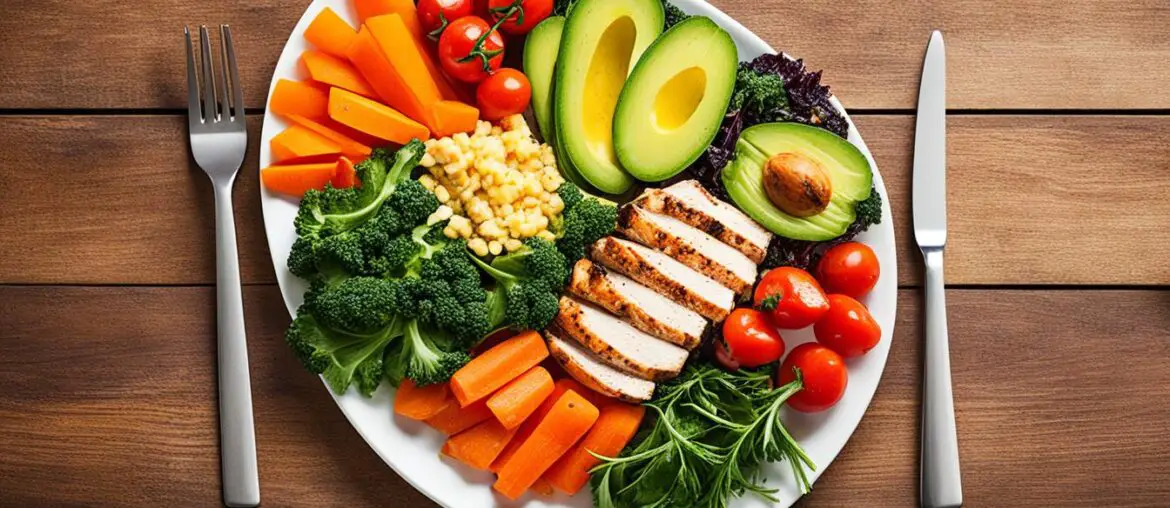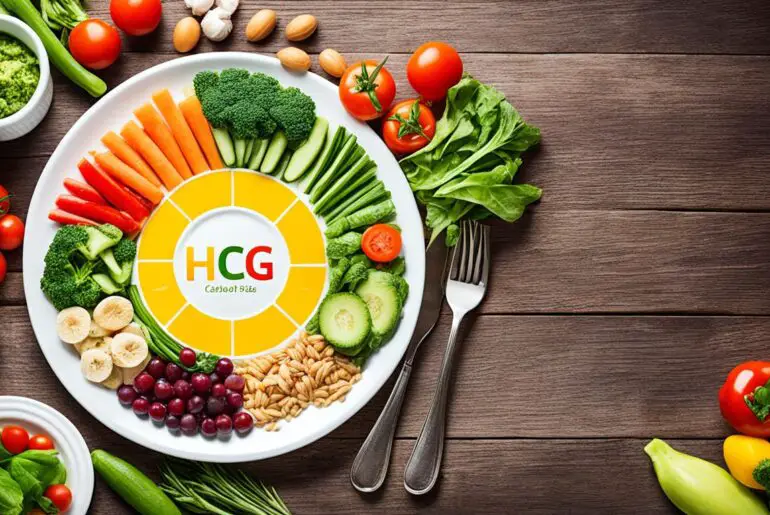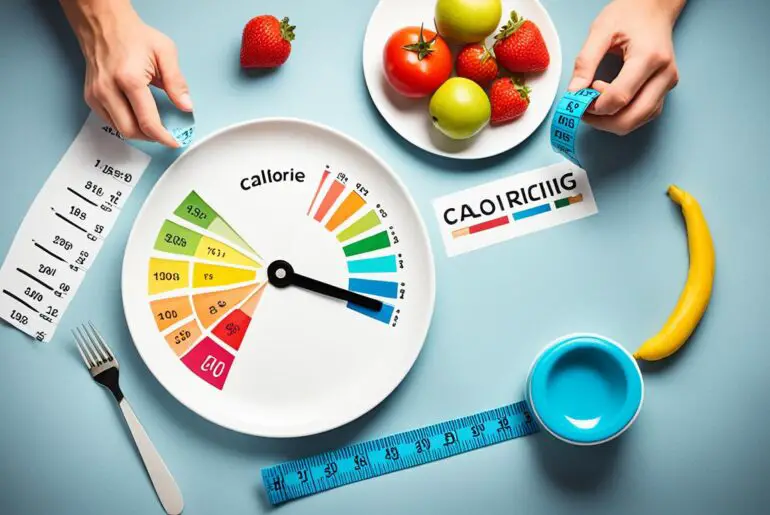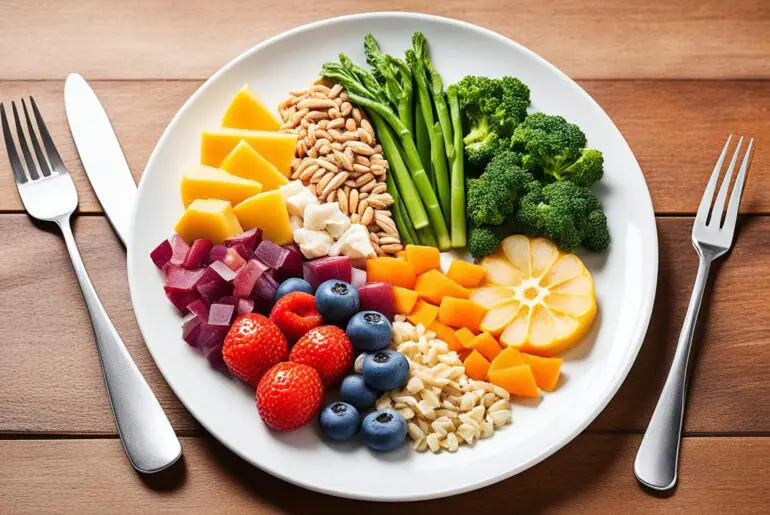Are you considering the HCG diet for rapid weight loss? You may be wondering what foods you can eat while following this low-calorie diet. The HCG diet restricts calorie intake to as low as 500 to 800 calories per day, making it crucial to choose the right calorie sources to fuel your body and promote weight loss. But which foods are considered the best for the HCG diet? Let’s explore the optimal calorie sources to help you achieve your weight loss goals effectively.
Key Takeaways:
- Choosing the right calorie sources on the HCG diet is crucial for effective weight loss.
- The diet primarily focuses on lean proteins and specific low-carbohydrate vegetables.
- Fruits are allowed but in limited quantities.
- The HCG diet is not scientifically proven and may have potential risks and nutrient deficiencies.
- Consulting with a healthcare professional is important before starting any weight loss plan.
What is the HCG diet?
The HCG diet is a weight loss plan that combines a very low-calorie diet with supplemental HCG injections. HCG, or human chorionic gonadotropin, is a hormone naturally produced in the body during pregnancy. The diet typically restricts calorie intake to 500 to 800 calories per day, which is significantly lower than the recommended daily intake for most adults.
The HCG diet is divided into three phases:
- Loading Phase: This initial phase typically lasts for two days and involves consuming high-calorie foods to build up fat stores in the body.
- Weight Loss Phase: During this phase, which can last from three to six weeks, the calorie intake is drastically reduced, and HCG injections are administered. The combination of the very low-calorie diet and HCG injections is believed to promote fat burning and suppress hunger.
- Maintenance Phase: Once the weight loss phase is complete, this phase focuses on gradually reintroducing foods while avoiding sugar and starch. It aims to help individuals transition to a long-term sustainable eating plan to maintain their weight loss.
It is important to note that the use of HCG for weight loss is not supported by scientific evidence and has not been approved by the FDA. While some people may experience rapid weight loss on the HCG diet, it is crucial to prioritize overall health and wellness when considering any weight loss program.
Risks and Concerns
The HCG diet’s very low-calorie intake can pose risks and concerns. Severely restricting calories for an extended period may result in nutrient deficiencies, muscle loss, fatigue, and irritability. Additionally, the FDA has issued warnings about the safety and fraudulent claims of HCG products for weight loss purposes. It is always advisable to consult with a healthcare professional or registered dietitian before starting any weight loss program.
The HCG diet combines a very low-calorie diet with HCG injections, claiming to facilitate rapid weight loss. However, healthcare professionals caution against its use due to limited scientific evidence and potential risks.
Recommended Foods on the HCG diet
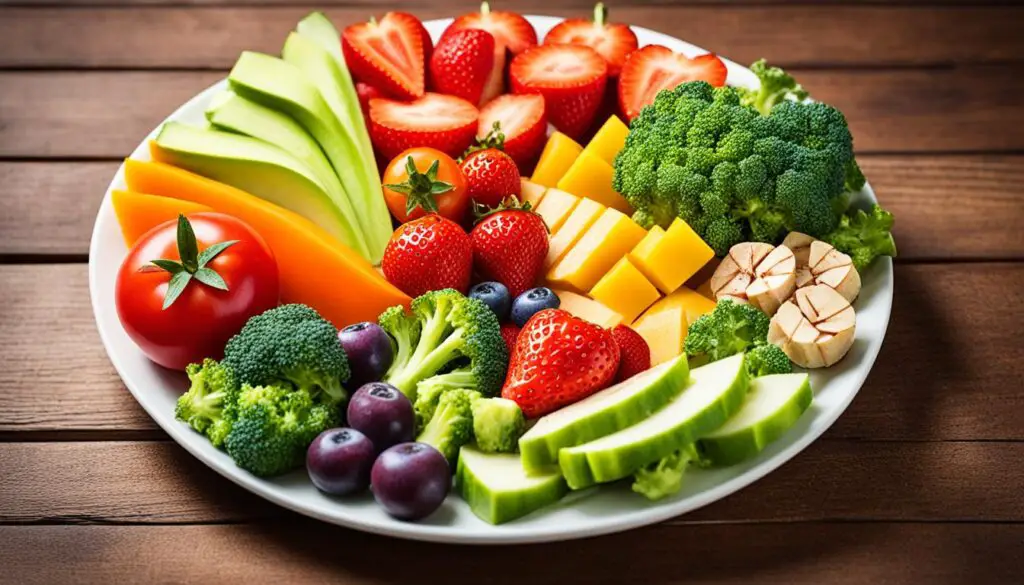
When following the HCG diet, it is crucial to focus on consuming the right foods to support weight loss and overall health. The diet allows for a variety of food choices within specific categories, including lean proteins, nonstarchy vegetables, and limited fruits.
Lean proteins are an essential part of the HCG diet as they provide necessary nutrients while keeping calorie intake low. Recommended sources of lean proteins include:
- Lean ground beef
- Pork loin
- Turkey cutlets
- Skinless chicken breast
- Baked white fish
These lean protein options offer a good balance of macronutrients, making them ideal for the HCG diet.
Nonstarchy vegetables are another crucial component of the HCG diet, providing essential vitamins, minerals, and fiber without adding excessive calories. Some nonstarchy vegetables that you can include in your meals are:
- Cauliflower
- Spinach
- White mushrooms
- Zucchini
- Cucumber
- Celery
These nonstarchy vegetables not only add variety to your meals but also contribute to satiety, helping you feel fuller for longer.
While fruits are limited on the HCG diet due to their natural sugar content, there are still some options that you can enjoy in moderation. Recommended fruits include:
- Watermelon
- Honeydew
- Cantaloupe
- Berries
These fruits are lower in sugar compared to other options and can add a touch of sweetness to your meals.
It is important to note that following the HCG diet requires strict adherence to the recommended food choices and portion sizes. By including lean proteins, nonstarchy vegetables, and limited fruits in your meals, you can support your weight loss journey while ensuring adequate nutrition.
Sample Meal Ideas on the HCG Diet:
| Meal | Proteins | Nonstarchy Vegetables | Fruits |
|---|---|---|---|
| Lunch | Grilled chicken breast | Spinach and cucumber salad | Berries |
| Dinner | Baked white fish | Roasted cauliflower | Watermelon |
| Snack | Turkey cutlets | Sautéed zucchini | Honeydew |
Remember to consult with a healthcare professional or registered dietitian before starting any new diet plan to ensure it aligns with your individual health needs and goals.
Safety and Concerns of the HCG diet
The HCG diet is a controversial weight loss plan that raises numerous safety concerns. It lacks scientific evidence to support its efficacy and has not been approved by the FDA for weight loss purposes. This raises questions about the safety and effectiveness of the diet.
Potential Nutrient Deficiencies
One of the major concerns with the HCG diet is the potential for nutrient deficiencies. The diet restricts various food groups, including starchy vegetables, grains, and legumes, which are important sources of essential nutrients.
The severe calorie restriction of the HCG diet can lead to deficiencies in important nutrients such as B vitamins, fiber, and fat-soluble vitamins. These nutrients play crucial roles in maintaining overall health and well-being.
Registered dietitians unanimously agree that the HCG diet is dangerous and should not be recommended due to the risk of nutrient deficiencies and subsequent health complications.
Lack of Scientific Evidence
Registered dietitians unanimously agree that the HCG diet is dangerous and should not be recommended.
Another significant concern is the lack of scientific evidence supporting the HCG diet. Despite its popularity, there is little to no research that verifies the effectiveness or safety of the diet for long-term weight loss.
Weight loss experts argue that any weight loss experienced during the HCG diet is primarily due to the severe calorie restriction, rather than the HCG injections themselves. Without scientific evidence to support its claims, the HCG diet remains a questionable approach for weight loss.
Expert Opinion
Registered dietitians and healthcare professionals unanimously advise against the HCG diet due to its safety concerns and lack of scientific evidence. They emphasize the importance of following evidence-based, sustainable weight loss approaches that prioritize overall health and well-being.
| Concerns | Expert Recommendations |
|---|---|
| Potential nutrient deficiencies | Focus on a balanced diet that includes a variety of fruits, vegetables, whole grains, and lean proteins. |
| Lack of scientific evidence | Choose evidence-based weight loss approaches supported by research and healthcare professionals. |
| Potential health risks | Avoid extreme diets and consult with a healthcare professional or registered dietitian for personalized advice. |
Clients should prioritize their well-being and long-term health by opting for sustainable weight loss strategies that emphasize healthy eating habits, regular physical activity, and the guidance of healthcare professionals.
Alternatives to the HCG diet for weight loss
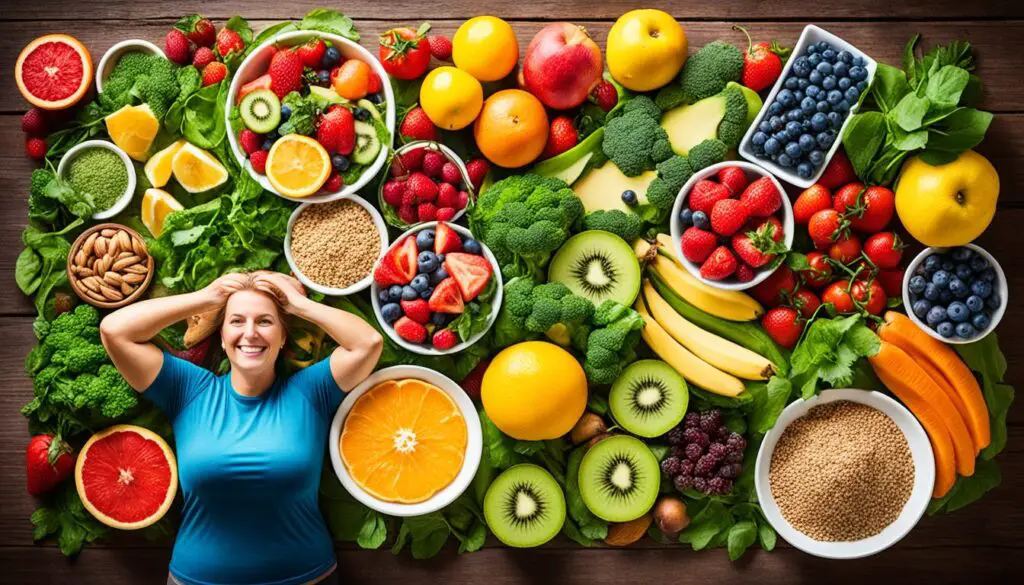
While the HCG diet may seem tempting for quick weight loss, there are safer and more sustainable alternatives available. These alternatives focus on developing healthy eating habits that can be maintained long-term, promoting not only weight loss but also overall well-being.
1. Balanced Meal Plans
One effective alternative to the HCG diet is following a balanced meal plan. This approach emphasizes consuming a variety of nutrient-dense foods in appropriate portion sizes. By including a mix of lean proteins, whole grains, fruits, vegetables, and healthy fats, you can ensure that your body receives essential nutrients while reducing calorie intake for weight loss.
2. Regular Physical Activity
Combining a healthy eating plan with regular physical activity is a key component of sustainable weight loss. Engaging in aerobic exercises, strength training, and other forms of physical activity can help boost metabolism, burn calories, and build lean muscle mass. Aim for at least 150 minutes of moderate-intensity exercise or 75 minutes of vigorous-intensity exercise per week.
3. Gradual Calorie Reduction
Instead of severely restricting calories like the HCG diet, a more gradual approach to calorie reduction is recommended. Gradually reducing your calorie intake by 500 to 1,000 calories per day can result in a safe and sustainable weight loss of 1 to 2 pounds per week. This approach ensures that your body still receives adequate energy while creating a calorie deficit for weight loss.
4. Consulting with Healthcare Professionals
It is crucial to consult with a healthcare professional or registered dietitian before embarking on any weight loss plan. They can provide personalized guidance and develop an individualized weight loss plan that fits your specific needs and goals. They can also monitor your progress, make necessary adjustments to the plan, and offer support throughout your weight loss journey.
A sustainable weight loss approach focuses on creating healthy eating habits that can be maintained long-term.
By adopting a sustainable weight loss approach, you can achieve your desired weight while prioritizing your overall health. Remember that weight loss should be a gradual process, and it’s important to be patient and consistent with your efforts.
| Benefits of Sustainable Weight Loss | Risks of the HCG Diet |
|---|---|
|
|
Potential Side Effects and Risks of the HCG diet
The HCG diet, despite its popularity, is not without its potential side effects and health risks. It is crucial to be aware of these risks before considering starting the HCG diet.
Side Effects
The following side effects are commonly associated with the HCG diet:
- Fatigue: Many individuals on the HCG diet experience fatigue due to the extremely low calorie intake.
- Irritability and Depression: The severe calorie restriction can lead to mood swings, irritability, and even depressive symptoms.
- Nutrient Deficiencies: The limited food choices on the HCG diet can result in nutrient deficiencies, particularly in essential vitamins and minerals.
- Constipation: The lack of fiber in the diet can cause constipation and digestive issues.
- Dry Skin and Hair Loss: Some individuals may experience dry skin and hair loss as a result of the imbalanced nutrient intake.
It is important to note that these side effects can vary from individual to individual, and not everyone will experience all of them.
Health Risks
While side effects can range from mild to moderate, there have also been reports of serious health risks associated with the HCG diet. These include:
- Pulmonary Embolism: Some individuals have developed blood clots in their lungs, leading to pulmonary embolism, a potentially life-threatening condition.
- Cardiac Arrest: There have been cases of cardiac arrest reported in individuals following the HCG diet, which can be fatal.
- Death: In extreme cases, the HCG diet has been associated with deaths, although these instances are rare.
It is essential to understand that the HCG diet is not approved by the FDA for weight loss, and the risks associated with it should not be taken lightly.
“The FDA has issued a warning about the safety and fraudulent weight-loss claims of HCG products.”
Maintenance Phase and Long-Term Approach to Weight Loss
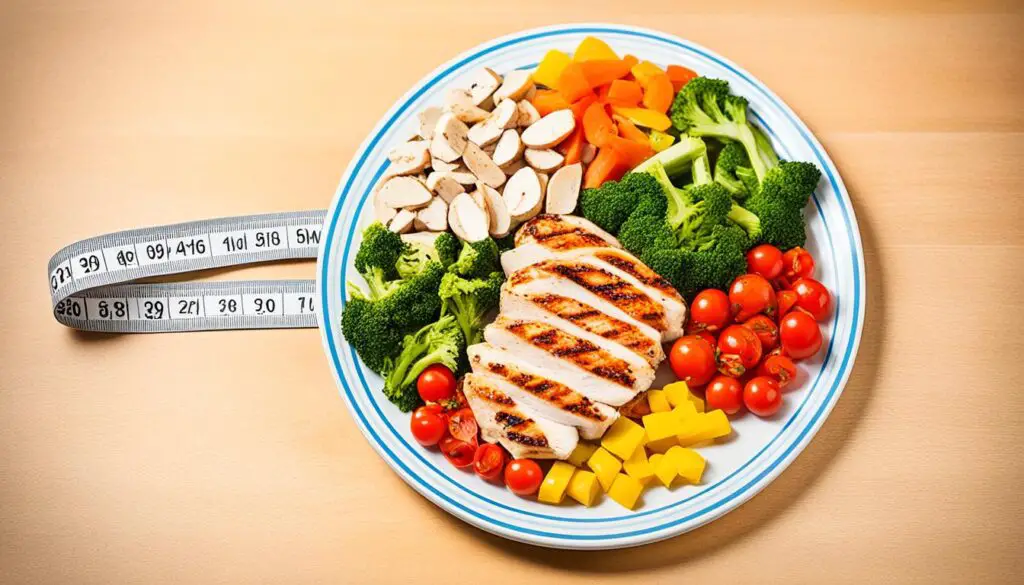
After completing the HCG diet, the maintenance phase is a critical component for maintaining long-term weight loss. This phase focuses on stabilizing weight and adopting healthier lifestyle habits for sustainable results. Gradually reintroducing foods while avoiding sugar and starch is key during this phase to prevent weight regain.
Regular weigh-ins serve as a metric of progress and help individuals stay accountable to their weight management goals. It is important to continue adhering to a healthy eating plan that includes nutrient-dense foods and portion control. This not only facilitates weight maintenance but also supports overall health and well-being.
Incorporating regular exercise into the maintenance phase further enhances long-term weight loss. Physical activity not only burns calories but also helps build lean muscle mass, which boosts metabolism. Aim for a combination of cardiovascular exercises, strength training, and flexibility exercises to achieve optimal results.
Maintaining a healthier lifestyle beyond the completion of the HCG diet is crucial for prolonged success. This involves making sustainable changes that prioritize nutritious food choices, regular physical activity, and stress management. By embracing a holistic approach to weight loss, individuals can achieve their desired weight and maintain it for the long term.
| Benefits | Recommendations |
|---|---|
| Stabilize weight | Gradually reintroduce foods while avoiding sugar and starch. |
| Accountability | Regular weigh-ins and monitoring progress. |
| Healthy eating plan | Adhere to a nutrient-dense diet with portion control. |
| Regular exercise | Incorporate cardiovascular, strength training, and flexibility exercises. |
| Long-term lifestyle changes | Prioritize nutritious food choices, physical activity, and stress management. |
The maintenance phase and the adoption of healthier lifestyle habits are essential for long-term weight loss success. By following the recommendations and embracing sustainable changes, individuals can achieve their weight management goals and enjoy a healthier and more fulfilling life.
Conclusion
After a thorough examination of the HCG diet and its potential benefits and risks, it is clear that this weight loss plan is not recommended by healthcare professionals. Despite claims of rapid weight loss, the HCG diet lacks scientific evidence to support its efficacy and safety. Moreover, the severe calorie restriction and limited food choices may lead to nutrient deficiencies and other health complications.
Instead, individuals looking for sustainable weight loss should opt for healthier alternatives that focus on balanced eating, regular physical activity, and gradual calorie reduction. These approaches promote long-term success and overall well-being.
To achieve your weight loss goals safely and effectively, it is crucial to consult with a healthcare professional or registered dietitian who can provide personalized guidance and support. They can help you develop a tailored weight loss plan that aligns with your specific needs and preferences, ensuring a healthier lifestyle for years to come.
FAQ
What are the optimal calorie sources for the HCG diet?
The HCG diet focuses on lean proteins, nonstarchy vegetables, and limited fruits as optimal calorie sources.
What is the HCG diet?
The HCG diet is a very low-calorie diet that combines calorie restriction with supplemental HCG injections.
What foods are recommended on the HCG diet?
The HCG diet allows for lean proteins such as lean ground beef, pork loin, turkey cutlets, skinless chicken breast, and baked white fish. Nonstarchy vegetables like cauliflower, spinach, white mushrooms, zucchini, cucumber, and celery are also permitted. Limited fruits include watermelon, honeydew, cantaloupe, and berries.
Is the HCG diet safe?
The HCG diet is not supported by scientific evidence and is considered unsafe due to potential nutrient deficiencies and lack of long-term safety data.
What are some alternatives to the HCG diet for weight loss?
Safer and more sustainable weight loss options include balanced meal plans, regular physical activity, and gradual calorie reduction.
What are the potential side effects and risks of the HCG diet?
The HCG diet can lead to side effects such as fatigue, irritability, depression, nutrient deficiencies, constipation, dry skin, and hair loss. Serious adverse reactions have also been reported, including pulmonary embolism, cardiac arrest, and death.
What is the maintenance phase of the HCG diet?
After completing the HCG diet, a maintenance phase is recommended to help stabilize weight. This phase involves gradually reintroducing foods while avoiding sugar and starch, and adhering to a healthy eating plan for long-term weight maintenance.
What should I consider when choosing a weight loss plan?
It is important to choose a weight loss plan that is evidence-based, incorporates balanced nutrition, regular physical activity, and fits your individual needs and goals. Consulting with a healthcare professional or registered dietitian is recommended for personalized guidance and support.

